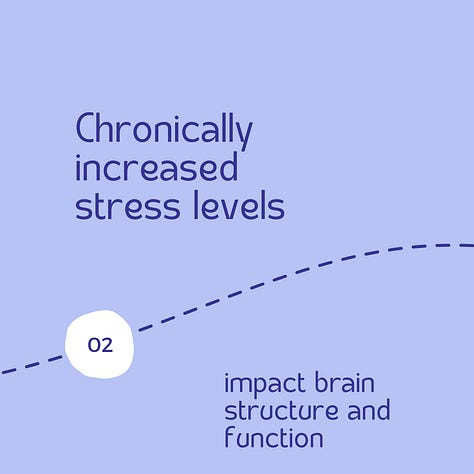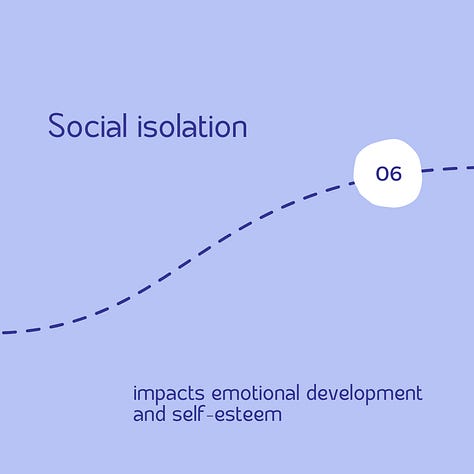We all need to practice self-care, but many teens forego self-care to get all the things they think are necessary to be their best — to be competitive for scholarships, to get into the best college, to be the best athlete — whatever their personal goals are. Unfortunately, when they try to do it all, they must take away from something (often sleep) to have time for everything.
The teen years are a time of rapid brain development, with profound changes occurring in areas related to emotional regulation, decision-making, and impulse control. The brain is particularly sensitive to environmental influences during this time, which means that lifestyle choices, including self-care, can significantly impact a teen’s overall well-being and mental health.
When teens neglect self-care, it can exacerbate the challenges they face, especially for those with conditions like ADHD, which already affect attention, impulse control, and emotional regulation.









Let’s look more closely at how a lack of self-care can impact the rapidly changing teen brain:
1. Sleep deprivation and its effects on brain development
Sleep is crucial for brain development during adolescence. It’s during sleep that the brain consolidates learning, processes emotions, and undergoes vital growth and pruning of neural connections. When teens don’t get enough sleep, the brain's ability to function optimally is compromised. Sleep deprivation can lead to:
Impaired memory and learning: The brain struggles to retain information, making it harder for teens to perform well in school.
Increased impulsivity: The prefrontal cortex, which is responsible for decision-making and impulse control, is one of the last brain areas to fully mature. Sleep deprivation can weaken its functioning, leading to poor decision-making and risk-taking behaviors.
Heightened emotional reactivity: The amygdala, which is involved in processing emotions, becomes overactive when sleep-deprived, resulting in exaggerated emotional responses like anger, sadness, or frustration.
2. Increased stress levels impact brain structure and function
The teenage brain is still developing its ability to manage stress. During adolescence the brain's stress response system is highly sensitive, making teens more susceptible to the negative effects of chronic stress. (I talked about the many effects of chronic stress in adults to a parent group and you can watch it here or find it on Spotify to get a feel for how it affects all our organ systems.)
When self-care is neglected, stress can accumulate, leading to:
Excessive cortisol production: Chronic stress raises cortisol levels, which can disrupt the development of the hippocampus (a brain area involved in learning and memory) and reduce its size. This makes it harder for teens to learn, remember, and focus.
Disrupted emotional regulation: An underdeveloped prefrontal cortex combined with high cortisol can impair a teen's ability to regulate emotions, making them more prone to anxiety, depression, or mood swings.
Poor coping mechanisms: Without self-care, teens may turn to unhealthy ways of managing stress, such as substance use or withdrawing from social activities, which can worsen mental health issues.
3. Nutritional deficiencies affect brain growth and neurotransmitter function
A balanced diet provides the nutrients necessary for the brain’s development and optimal functioning.
Teens who neglect self-care may not eat well or skip meals, which can result in nutritional deficiencies that impact the brain, including:
Reduced neurotransmitter production: Nutrients like proteins, omega-3 fatty acids, vitamins, and minerals are critical for the production of neurotransmitters such as dopamine and serotonin. Deficiencies can lead to imbalances, causing problems with mood, attention, and energy levels.
Slowed brain growth: Poor nutrition can affect the formation of new brain cells and synapses, potentially stunting brain growth and impacting cognitive development.
4. Sedentary lifestyle affects brain plasticity and mood regulation
Physical activity is not just beneficial for physical health but also plays a vital role in maintaining brain plasticity, the brain's ability to reorganize and form new connections. Teens who lack regular physical activity due to poor self-care may experience:
Decreased brain plasticity: Exercise stimulates the release of brain-derived neurotrophic factor (BDNF), a protein that supports brain plasticity. Without regular exercise, BDNF levels can drop, reducing the brain's ability to adapt, learn, and recover from stress.
Worsened mood disorders: Physical activity has been shown to reduce symptoms of anxiety and depression by boosting endorphins and other mood-regulating chemicals. A lack of exercise can exacerbate mood disorders and reduce motivation.
5. Excessive screen time affects attention and impulse control
When teens spend excessive time on screens, especially late at night, it can interfere with sleep, disrupt attention, and increase impulsivity. They also get less exercise and face-to-face human interaction when they spend time online, both of which are beneficial for well-being. Overexposure to digital media can affect the developing brain in several ways:
Shortened attention span: Constant exposure to fast-paced digital content can train the brain to expect instant gratification, making it harder for teens to focus on tasks that require sustained attention.
Increased risk of addiction-like behaviors: The reward centers of the brain are highly active during adolescence, making teens more vulnerable to engaging in behaviors that stimulate dopamine release, such as gaming or social media use. This can lead to more screen use and neglect of other self-care activities.
6. Social isolation impacts emotional development and self-esteem
Teens who neglect social self-care, such as spending time with friends or engaging in meaningful social activities, may experience loneliness and social isolation. This can have a significant impact on the adolescent brain:
Reduced development of social skills: Adolescence is a critical time for refining social skills and understanding social cues. Lack of social interaction can hinder the development of these skills, making it harder for teens to build relationships.
Lowered self-esteem: Positive social experiences help boost self-esteem. Without these interactions, teens may experience feelings of rejection or inadequacy, which can negatively impact their mental health.
7. Impact on long-term brain health
The brain's structure and function continue to develop well into the 20s (maybe even early 30s and beyond), and habits formed during the teen years can shape future mental health and cognitive function.
Persistent neglect of self-care can increase the risk of:
Chronic mental health issues: Conditions like anxiety, depression, and ADHD symptoms may worsen or persist if self-care is consistently neglected.
Cognitive difficulties: Teens who don't prioritize self-care may experience long-term challenges with memory, learning, and executive functioning, affecting their academic and career success.
Need More?
I invite teens to learn about the importance of self-cares with me. I’ll be talking about this topic in two upcoming classes through different platforms.
The first opportunity is November 2nd at 3:30 PM CST. It’s one of the Director’s Cut series of workshops, Setting the Stage for Success. These workshops are more than the 90-minute online class — there is an opportunity for students to continue conversations and ask questions in a private moderated online forum and students are encouraged to work on worksheet pages in weekly follow up motivational emails for the month following the course.
The second opportunity to learn about self-care is part of the ADHDKCTeen monthly class offerings on December 3rd at 5:30 PM CST: Resolutions to Be Your Best. ADHDKCTeen is part of the KC Metro CHADD chapter, ADHDKC, and their free classes are open to anyone who wants to join. Registration for the November talk about Sensory Processing is still open and the next two Parent Group Events are also great for teens! See all chapter upcoming events on the ADHDKC Events Page.
Summary
The rapidly changing teen brain is highly influenced by lifestyle choices, making self-care an essential practice during adolescence. For teens with neurodevelopmental differences like ADHD, the importance of self-care is even more pronounced, as it helps manage symptoms and supports healthy brain development. By prioritizing activities that promote good sleep, nutrition, physical activity, and social interaction, teens can improve their brain health and set themselves up for a brighter future.
Parents, educators, and caregivers can play a crucial role in encouraging self-care habits, modeling positive behaviors, and providing the resources teens need to make self-care a part of their daily lives. Taking care of the mind and body during these formative years is an investment in lifelong well-being.




